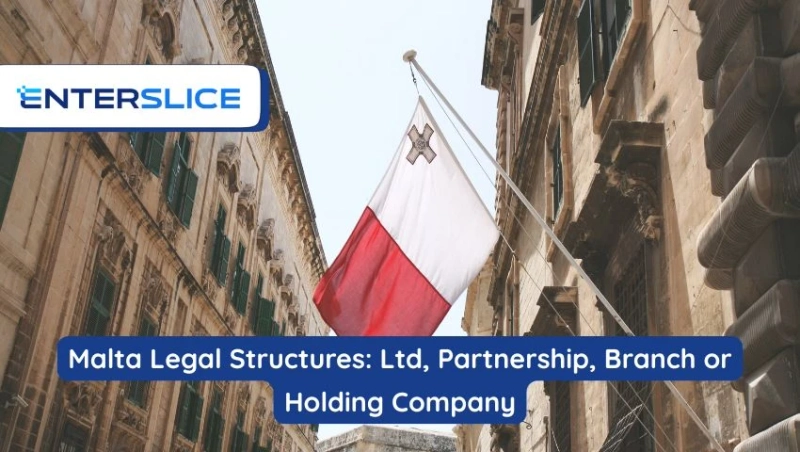Malta has become one of the most attractive jurisdictions in Europe for entrepreneurs and international businesses. Its strategic location, competitive tax system, and robust legal framework make it a prime destination for company formation. However, before you proceed with company registration in Malta, it's crucial to understand the different legal structures available.
This guide covers the four most common business forms in Malta: the Private Limited Company (Ltd), Partnerships, Branch Offices, and Holding Companies. By comparing their features, benefits, and use cases, you'll be better positioned to choose the right structure for your business.
1. Private Limited Company (Ltd)
The Private Limited Company, or Ltd, is the most common and versatile legal form in Malta. It’s suitable for both local entrepreneurs and foreign investors looking to register a company in Malta for trading, consultancy, or other commercial activities.
Key Features
- Separate Legal Entity: An Ltd is a separate legal person from its shareholders.
- Limited Liability: Shareholders' liability is limited to their capital contribution.
- Minimum Capital: €1,165 is the minimum share capital; 20% (€233) must be paid up at registration.
- Shareholders and Directors: Requires at least one shareholder and one director (can be the same individual).
- Registered Office: Must maintain a registered office in Malta.
Taxation
Malta operates a full imputation system of taxation, with a corporate tax rate of 35%. However, shareholders (especially non-residents) may claim a tax refund of up to 6/7ths, effectively reducing the tax burden to 5% or less in many cases.
When to Choose an Ltd
- You want to conduct commercial trading.
- You prefer limited liability protection.
- You need a flexible, internationally recognized structure.
- You aim to benefit from Malta’s tax refund system.
The Ltd structure is ideal for most businesses involved in international services, e-commerce, technology, and consultancy.
2. Partnership (En Commandite or En Nom Collectif)
Malta recognizes two main types of partnerships:
- En Nom Collectif (General Partnership)
- En Commandite (Limited Partnership)
Both are suitable for small to medium-sized enterprises or joint ventures where multiple individuals wish to operate under a common business name.
General Partnership (En Nom Collectif)
In a general partnership, all partners are jointly and severally liable for the debts and obligations of the partnership. There is no legal separation between the entity and the partners.
Limited Partnership (En Commandite)
In a limited partnership, there are:
- General Partners (with unlimited liability) and
- Limited Partners (liable only up to their investment).
A limited partnership can elect to have a separate legal personality and may be structured similarly to a fund or investment vehicle.
Taxation
- Partnerships without legal personality are tax-transparent.
- Income is taxed in the hands of the partners based on their share.
- Partnerships with legal personality are taxed like companies.
When to Choose a Partnership
- You are entering a small business with trusted partners.
- You want flexibility in profit sharing.
- You operate in a low-risk industry or professional service.
Partnerships are less common for international operations due to unlimited liability (in general partnerships) and less corporate appeal compared to Ltd companies.
Also Read: Eligibility Criteria to Start a Business in Spain
3. Branch Office
A branch office allows a foreign company to establish a presence in Malta without forming a separate legal entity. It operates as an extension of the parent company and is suitable for multinational corporations expanding into the Maltese market.
Key Features
- Not a Separate Legal Entity: Legally part of the foreign parent company.
- Same Name: Operates under the same name, unless otherwise approved.
- Registration: Must register with the Malta Business Registry (MBR) and provide documents related to the parent company.
- Local Representative: Must appoint an authorized person to represent the branch in Malta.
Taxation
- A branch is taxed in Malta on income sourced within Malta.
- Subject to the standard corporate tax rate of 35%, with access to refund mechanisms for non-resident shareholders.
When to Choose a Branch
- Your foreign company wants a local footprint in Malta without forming a new entity.
- You need to carry out marketing, support, or operations locally.
- You want to test the Maltese market before full expansion.
A branch is a cost-effective option for short to medium-term expansion, especially in regulated industries like banking, finance, or shipping.
4. Holding Company
A Holding Company in Malta is typically structured as a Private Limited Company, but its core function is to own shares or assets in other companies. Malta is particularly attractive for holding structures due to its favorable participation exemption regime.
Key Features
- Operates as an Ltd with minimal commercial activity.
- Owns equity or debt instruments in subsidiaries.
- Can also hold intellectual property or real estate.
Tax Advantages
- Participation Exemption: No tax on dividends or capital gains from qualifying subsidiaries.
- No Withholding Tax: On dividends, interest, or royalties paid to non-residents.
- Extensive Double Tax Treaties: Malta has over 70 tax treaties, reducing foreign withholding tax exposure.
When to Choose a Holding Company
- You want to centralize asset ownership or manage investments.
- You need to optimize international tax planning.
- You are creating a group structure with multiple subsidiaries.
Malta is widely used for holding companies by multinational groups, private equity investors, and intellectual property businesses.
Choosing the Right Structure
Choosing the right legal form for your business depends on several factors. If liability protection is a primary concern, a Limited Liability Company (Ltd) or a Limited Partnership is the ideal structure.
For those seeking a low-cost entry into the market, a General Partnership offers a more affordable and straightforward setup. When planning for international expansion, establishing a Branch Office or a Holding Company can provide the necessary framework and flexibility. A Holding Company is also the preferred structure for asset ownership and investment, offering both centralized control and potential tax benefits.
For businesses focused on local operations, either an Ltd or a Branch Office would be appropriate, depending on the level of independence and operational needs. While Malta provides a flexible and tax-efficient environment, the final choice should be guided by your specific business goals, funding needs, and risk appetite.
Opening a Company in Malta: Key Steps
Regardless of the structure you choose, the general steps to register a company in Malta include:
- Choose Company Name: Must be unique and approved by the Malta Business Registry (MBR).
- Prepare Documents: Including Memorandum and Articles of Association (for Ltd), partnership agreement, or branch documentation.
- Deposit Share Capital: For Ltds, a minimum of €1,165 (20% paid up) is required.
- Register with the MBR: File all incorporation forms and pay applicable fees.
- Tax Registration: Apply for a tax ID, VAT number, and, if necessary, register for employer and social security obligations.
- Open a Bank Account: Once the company is incorporated.
Legal and tax advisory services are highly recommended to ensure compliance and efficiency during the formation process.
Also Read: Documents Required for Business Setup in Barbados
FAQs
1. Can a foreigner open a company in Malta?
Yes. Foreign individuals and entities can own 100% of a Maltese company. There are no nationality restrictions, and Malta actively encourages foreign direct investment.
2. What is the minimum capital requirement for an Ltd in Malta?
The minimum share capital for a Private Ltd is €1,165, with at least 20% (€233) paid upon incorporation.
3. Is Malta a good jurisdiction for holding companies?
Yes. Malta offers a participation exemption for qualifying holdings, no withholding tax on outgoing payments, and access to a broad tax treaty network, making it ideal for holding structures.
Whether you're launching a local venture or planning international operations, Malta offers a variety of flexible legal forms. By carefully assessing your goals and working with experienced professionals, you can choose the optimal structure for opening a company in Malta.



